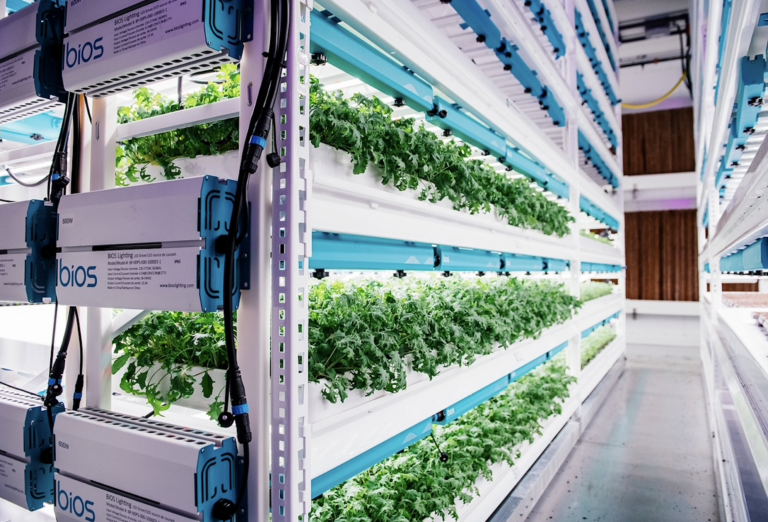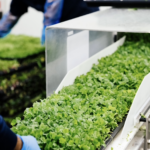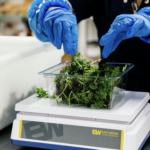
- Kim Kisner
- Business
- 02/11/2025
Planted Detroit Goes Vertical Toward Providing Communities Fresh Food and Reducing Carbon Footprint

Planted Detroit is a vertical farming company located in the heart of the city, dedicated to redefining the way fresh produce is grown and distributed. By leveraging Controlled Environment Agriculture (CEA) and a commitment to biosecurity, the company focuses on producing high-quality greens year-round while minimizing environmental impact. Its model aims to ensure fresher, longer-lasting food while reducing the carbon footprint associated with traditional farming and long-distance transportation.
SBN Detroit interviewed CEO and founder Tom Adamczyk to discuss the company’s sustainability efforts, how vertical farming plays a role in reshaping the food system, and what this means for businesses and consumers in Southeast Michigan.
Q: Your background is in finance – what prompted the shift to develop Planted Detroit?
A: Yes, my background is in capital markets and finance, particularly mergers, acquisitions, and investment management. Part of that work involved identifying emerging technologies and investment opportunities, with a specific focus on agriculture and sustainability.
Through this research, I began looking at broader issues within the food supply chain and seeing systemic issues. Consumers are often paying higher prices for food that is lower in quality, and much of that is due to inefficiencies in how food is grown, transported, and distributed. A significant portion of fresh produce travels thousands of miles before reaching grocery stores, which impacts its nutritional value and shelf life while increasing costs and environmental impact.

In 2016–2017, I started researching alternative agricultural models, including controlled environment agriculture. Vertical farming stood out as a viable approach to addressing these challenges. Rather than just investing in the sector, I wanted to fully understand how to make vertical farming both sustainable and economically viable – and be a part of it. That led to the launch of Planted Detroit in 2018.
Q: Why did you choose vertical farming as your model? What advantages does it offer in terms of sustainability?
A: I evaluated multiple controlled environment agriculture models, including greenhouse farming but determined that vertical farming had more scalability potential in urban environments and was more aligned with what I think needs to be done on a large scale for mass food production.
The ability to grow vertically also makes it possible to produce more food within a smaller physical footprint. Compared to traditional farming, this method uses fewer natural resources while maintaining consistent production levels.
Q: How do you approach energy efficiency in vertical farming?
A: When I first started researching vertical farming, LED lighting technology was still evolving. The legalization of cannabis led to significant advancements in this area, as companies like GE and Philips invested in more efficient, cost-effective grow lights. This helped drive down costs and improve performance, making vertical farming more viable at scale.
LED lighting systems now allow for adjustments to optimize plant growth and energy use. These new lighting systems generate less heat, which means we only use and pay for the photons needed for plant growth. One of our lights allows us to tune the spectrum from red to blue, which not only impacts the plant’s taste and growth but also improves energy efficiency.
Q: How does vertical farming contribute to a more sustainable food system in Southeast Michigan?
A: One of the primary challenges in food systems is access to fresh, high-quality produce, and locally based food production can play a role in improving availability.
Growing food year-round in a climate like Michigan’s is an advantage in itself. Seasonal limitations often mean that fresh produce must be imported from across the country. By producing food locally, we can shorten the time between harvest and consumption, helping to preserve both nutritional value and quality.
In the long term, the goal is to establish a model where fresh, nutrient-rich food is widely accessible, whether through direct-to-consumer sales, grocery stores, or partnerships.
Q: What other sustainability practices are in place at Planted Detroit?
A: As I mentioned, energy efficiency is a key consideration, both from an environmental and operational standpoint. Lighting and climate control systems are continuously optimized to minimize energy consumption while maintaining stable growing conditions.
Water usage is another critical factor. Vertical hydroponic systems allow for 95% less water consumption compared to traditional farming methods. Our system feeds the plants at their root systems with nutrient-dosed water that is then recirculated and cycled back through the plants. This saves a lot of water.

In terms of waste management, growing media is used only once per crop cycle and then composted. Local organizations, including Sanctuary Farms, repurpose the composted material, creating a closed-loop system that supports other agricultural efforts in the area.
Food waste is also minimized. Any excess products that cannot be sold are donated through Food Rescue U.S. to prevent unnecessary landfill contributions. Packaging materials are continuously evaluated to maximize recyclability.
Q: How does Controlled Environment Agriculture (CEA) compare to traditional farming in terms of resource efficiency?
A: Water conservation is one of the most significant benefits. With increasing climate challenges, particularly droughts, the ability to grow food using a fraction of the water required by traditional agriculture is an important factor.
Energy consumption is often discussed in relation to CEA, as artificial lighting does require electricity. However, when considering the entire supply chain—including long-haul transportation, refrigeration, and food spoilage—vertical farming presents efficiencies that help offset its energy use. Additionally, because production is demand-driven, it reduces overproduction and associated waste.
Q: How do vertical farming and a shorter supply chain benefit businesses and consumers?
A: Reducing the number of steps between food production and consumption improves both freshness and sustainability. My goal is farm-to-fork. People should be able to buy their food directly from the farm and put it in their refrigerator.
With urban farming, food can be harvested and delivered within a short timeframe, preserving its quality and reducing spoilage. While scaling this model presents logistical challenges, it represents a shift toward a more localized and efficient food system.
Q: Who are your main customers, and how do they influence your sustainability goals?
A: Most of our customers are in Southeast Michigan. Many are individuals looking for fresh, convenient meal solutions, but we also work with grocery retailers like Meijer and Plum Market, as well as healthcare providers like Corewell Health, which prioritize offering fresh, nutritious food to their patients and employees.
Restaurants have also played a role in shaping how we operate. Early on, chefs helped us refine the quality and consistency of our products. As we continue to expand, consumer demand for locally grown, minimally processed food continues to reinforce the need for sustainable production methods.
Be sure to subscribe to our newsletter for regular updates on sustainable business practices in and around Detroit.
Kim Kisner
- All
- Business
- Community
- Education
- Events

Unique Monique Scented Candles, a Detroit-based business founded by Monique Bounds., aims to produce candles and household products with clean ingredients and local supply chains. What began as a personal hobby during college has evolved into a full-time venture producing coconut oil and soy-based candles made with essential oils and locally sourced materials. SBN Detroit interviewed Bounds about launching a sustainable product line, sourcing challenges in Michigan, and...

Eastern Market Partnership, in collaboration with the City of Detroit’s Office of Sustainability Urban Agriculture Division, has announced $240,000 in grant funding to support Detroit-based farmers and farmer collectives. The grants will advance food access, climate education, sustainable land use, and economic opportunity, with priority given to Black- and Indigenous-led farms, youth-led initiatives, and projects rooted in historically disinvested neighborhoods. The recipients – ranging from cooperatives and community...

Citizen Robotics is a Detroit-based nonprofit that advances the use of robotics and digital manufacturing in residential construction, focusing on improving productivity, sustainability, and long-term affordability. Best known for its early work in 3D-printed housing, it explores how alternative construction methods and new financial models can reduce material waste, lower lifetime operating costs, and enhance the resilience of homes. SBN Detroit interviewed Tom Woodman, founder and president of...







